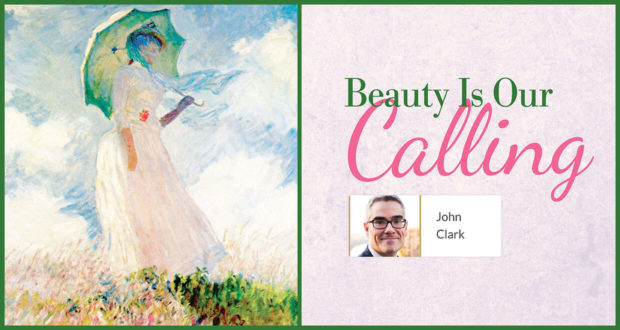Summary
Asked to opine on beauty, John Clark says that every Catholic family is a reflection of God and is a form of beauty that rises above the material world.Every two months, my editor informs me of the theme for the upcoming issue of this periodical.
When I was informed that this month’s choice was “beauty,” it was with trepidation that I dutifully opened my Macbook and pressed the button for “New Document.”
You see, while beauty is always simple, it is never simplistic. In fact, “beauty” has proven almost impossible to define. Insofar as man clumsily grasps for a scientific definition, beauty expresses itself more symmetrically in poetry than in prose. And even then, sculpture and musical instruments often express and explain beauty more keenly than the jumbled words of poets.
For instance, Michelangelo’s Pieta and Mozart’s Flute Concerto No. 1 in G Major, communicate breathtaking beauty, and one imperils himself in the attempt to explain these masterpieces with the words found in an unforgiving lexicon. Thus, because I work in ink rather than oils, the apprehension. Nevertheless, I began to think about the things in my life that are beautiful—that of which I can say without hesitation: This is beauty. And I thought of my family. More universally, I thought of all Catholic families.
Let me explain.
Beauty lies in the realm of “ultimate” things, or as the classic philosophers like Aristotle once called them, “ends.” It is a thing that, once fulfilled, leaves nothing further to be desired. And while Aristotle explains that happiness itself is the ultimate end, beauty occupies the same space as happiness; in fact, beauty and happiness find themselves inseparable—even indistinguishable from one another. For it is both beauty and happiness that we seek, evidenced in the fact that we Catholics can say—and say rightly—that our ultimate end is the Beatific Vision.
The Catholic family—composed of individual members in the state of sanctifying grace, each with an indwelling of the Trinity—is a reflection of God, and thus exhibits a form of beauty that rises above (or, as the philosophers say, “transcends”) the mere material world.
In our everyday homeschool world, we are surrounded by beauty. That’s no minor point. In a world in which we Catholics increasingly feel out of place, we increasingly feel at home at home. Roger Scruton, the recently-departed philosopher of beauty, argues for the importance of beauty and home: “We are needy creatures, and our greatest need is for home—the place where we are, where we find protection and love. We achieve this home through representations of our own belonging, not alone but in conjunction with others.”
My wife and children are beautiful representations—witnesses—of my belonging, and I of theirs. All in all, our family is a testimony to the love of God. And so is yours. That is beauty.
That “conjunction with others” and its relation to beauty is also worth pondering. Aristotle says that “to be beautiful, a living creature, and every whole made up of parts, must not only present a certain order in
its arrangement of parts, but also be of a certain definite magnitude.”
Please consider that Aristotle’s very definition of “beauty” here could also serve as a definition of “family.” The love of a husband and wife produces new and immortal human life; in an immediate flash of Creation, a man becomes a father, and a woman becomes a mother—a role of almost impossible magnitude and beauty that is only perfectly realized in the Beatific presence of God.
A Family’s Destiny
And on that point, Pope Saint John Paul II writes that the sacrament of Matrimony is not only a “memorial” of God’s work and an “actuation” of a love for family, it is also a “prophecy” that gives husbands and wives “the grace and duty of living and bearing witness to the hope of the future encounter with Christ.” That is a more eloquent way of saying that while beauty surrounds us and is present in us, we are called to perfect beauty in Heaven—along with our families. Lest we forget, the communion of saints is composed, in large measure, by the communion of families, triumphantly reunited in Heaven.
That is a thought that should console those of us who have lost parents, children, and wife or husband. It is also a thought of future consolation when our dearly beloved tearfully depart. Because sadness is not the end of the story; rather, beauty is the end of the story, as well as the beginning.
For my part, I await that eternal moment where—in the presence of God—Lisa sees the Divine Trinity reflected in my soul and looks upon me as Beatrice once gazed at Dante. As you homeschool families move through your lives, remember that our families are destined for a place of perfect love, fulfillment, happiness.
And beauty.

 Seton Magazine Catholic Homeschool Articles, Advice & Resources
Seton Magazine Catholic Homeschool Articles, Advice & Resources
